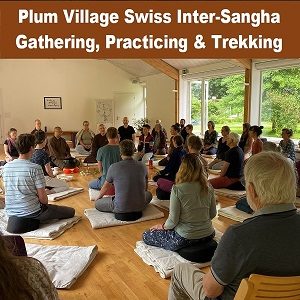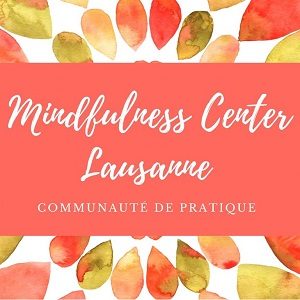
« Sometimes your joy is the source of your smile, but sometimes your smile can be the source of your joy. » Zen Master Thich Nhat Hanh (1926 – 2022).

Specialized in transformational change and flourishing, we contribute to a better world teaming for excellence in the development of mindfulness communities of practice, leading to a sustainable increase in well-being and performance in organizations, people and teams.
About Mindfulness
The term mindfulness derives from the Pali language word sati (Sanskrit: smriti) meaning remember. The Chinese character for mindfulness has two parts: now, and mind or heart. Quoting Zen Master Thich Nhat Hanh: « Mindfulness is remembering to come back to the present moment. »
The Pali language word sati derives from the Sanskrit language root sat meaning to exist. Therefore, mindfulness means: « The awareness of the existence of experienced phenomena in a given moment », or « Full awareness of mind (and therefore mind-objects) in the present moment. »
Mindfulness Origine
Mindfulness techniques originate from ancient Yoga and Buddhist spiritual practices and need to be understood in such context. In these traditions, mindfulness practices contain the seeds of ethical actions and wisdom. Such seeds though do not need to be fully cognitively understood by the practitioners for them to manifest. Mindfulness operates like a gentle rain nourishing ethical actions and wisdom in due time.
Mindfulness and Transformation
Mindfulness practice restores internal and external balance, transforming hurtful emotions and perceptions (e.g., fear, anger, despair, separation, loneliness, etc.), looking deeply into ourselves and around us, seeing our true nature and the nature of things, and generating insight.
Mindfulness and Flourishing
Mindfulness practice cultivates and strengthens all wholesome seeds in our unconscious minds (e.g., stability and solidity, flexibility, energy, love, joy, wisdom, and freedom, as well as all character strengths and any other strength or meta-strength like compassion, tranquility, patience, equanimity, trust, etc.).
By nurturing and strengthening the energy of mindfulness, the meditation practitioner blooms like a flower, full of beauty, freshness, aliveness, and happiness.
Mindfulness has the power to transform each breath into an embodied soothing and joyful flourishing experience, getting in direct contact with the worders of life, as well as the strength seeds lying down in our mind, letting them bloom.
Practicing mindfulness cultivates and primes the unconscious mind, encourages the development of automatic and flourishing behavioral and perceptual responses, habit energies, sustainable brain changes, and insight.
Evidence-Base Results of the Mindfulness Practice
Since the introduction of the MBSR by Jon Kabat-Zinn in 1979 at the MBSR Clinic at the University of Massachusetts Medical Center, now the Center for Mindfulness in Medicine, Health Care and Society, the positive effects of mindfulness practices have been largely scientifically demonstrated. Identical results have been achieved in the treatment and prevention of depression with the MBCT program.
Mindfulness as a Deliberate Cultivation of the Mind
We do also know that immaterial mental activity maps to neural activity, producing temporary and lasting changes in our brains. This means we can use our minds to change our brains for the better – self-directed neuroplasticity.
Since our brain learns mainly from what we attend to, mindfulness is the doorway to taking in good experiences and making them a part of ourselves. Directing attention skillfully is therefore a fundamental way to shape the brain – and one’s life over time. A wise combination of mindfulness and character strengths serves the purpose of deliberately cultivating our minds.
Mindfulness and Character Strengths
During the last 20 years, the number of studies looking at the correlation between character strengths and many topic areas (e.g., well-being, health and wellness, achievement, mindfulness, positive relationships, workplace and organizations, parenting, etc.) has grown considerably and, fortunately, the VIA Institute on Character keeps track of them.
The cultivation of character strengths has been a key question from the very beginning of the positive psychology discipline. The cultivation of character strengths (i.e., gratitude, hope, zest, curiosity, and love) is correlated with well-being, but also with job satisfaction and productivity.
A wise combination of mindfulness and character strengths serves the purpose of deliberately cultivating our minds. Mindfulness improves the ability to uncover, nurture, and manifest character strengths consciously. Character strengths, in turn, can be used to reinforce a congruent, joyful and engaged mindfulness practice. Such practical integration of mindfulness and character strengths in life generates a flourishing upward spiral.
Flourishing with Integrative and Engaged Mindfulness
With integrative mindfulness the transformational change leading to flourishing is done at the base of the body-mind consciousness with self-congruence, this is with concordance between conscious and non-conscious assessments, with the term self here understood as a process, not as an essence.
Engaged mindfulness broadens choices for self-endorsed actions, aligned with authentic values, needs, intentions, and motives, as well as with universal ethical values established by the manifesto 2000 of the United Nations.
Integrative and engaged mindfulness is the essence of the Plum Village tradition, which encompasses the insight of the Manifestation Only Buddhist Psychology and the contemporary engaged Buddhism practice proposed by Zen Master Thich Nhat Hanh.
Mindfulness-Based Strengths Practice (MBSP)
Mindfulness-Based Strengths Practice (MBSP) is a new program developed and launched worldwide in 2014 by Psy.D. Ryan M. Niemiec, Education Director of the VIA Institute on Character.
MBSP brings together the latest science of mindfulness and character strengths into an active learning experience to help people flourish by getting in contact with, appreciating, and cultivating their inner character strengths (e.g., curiosity, open-mindedness, self-regulation, perseverance, perspective, leadership, teamwork, kindness, social intelligence, humor, hope, etc.).
This evidence-based mindfulness and positive psychology program introduces the art of developing sustainable well-being, health, and performance through mindful and heartful balanced strengths use, proposing a blending of self-leadership flourishing strategies, experiential exercises, different types of mindfulness practices, dyad conversations, group sharing, and journaling.
MBSP is for people aiming to flourish by developing a more integrative self-as-process awareness and a better sense of their own whole identity and resourceful mind, as well as by increasing positive emotions and relationships, life and work engagement, purpose, and accomplishment (PERMA).
VIA Institute on Character
Based in Cincinnati, Ohio, the VIA Institute on Character (VIA Institute) is a non-profit organization dedicated to bringing the science of character strengths to the world. It does so by creating and validating surveys of character, supporting researchers, and developing practical strengths-based tools for individuals and professionals, such as therapists, managers, and educators. In this spirit, the VIA Survey is offered free of charge worldwide in many languages.
In the early 2000s, the VIA Institute supported pivotal work on the nature of positive character. A 3-year, 55-scientist study led by Christopher Peterson and Martin Seligman culminated in the landmark text Character Strengths and Virtues: A Handbook and Classification. The project also involved the creation of two valid and free measurement tools—the VIA Inventory of Strengths (colloquially known as the VIA Survey) for adults, and the VIA Youth Survey.
The mission of the VIA Institute is to help people change their lives and live more fully by tapping into the power of their own greatest strengths.
Managing Director of Gallifa & Partner LLC, Jaume Gallifa followed the Via Institute’s Character Strengths Interventions program in 2018 and received the Mindfulness-Based Strengths Practice (MBSP) chartered lead practitioner certification in 2021. From that moment Jaume is pioneering the integration of mindfulness, character strengths, self-leadership, and coaching practices in the world with The Flourishing Circle initiative.
Order of Interbeing | Tiep Hien Order
The Order of Interbeing (OI), Tiep Hien in Vietnamese, is a community of monastics and lay people, all ordained students of Zen Master Thich Nhat Hanh, who have committed to living their lives in accord with the Fourteen Mindfulness Trainings, a distillation of the Bodhisattva (Enlightened Being) teachings of Mahayana Buddhism.
Established by Zen Master Thich Nhat Hanh in Saigon in 1966 with the name Tiep Hien, the OI was founded in the Linji tradition of Buddhist meditative practice and emphasizes the Four Spirits: non-attachment from views, direct experimentation on the nature of interdependent origination through meditation, appropriateness, and skillful means.
Managing Director of Gallifa & Partner LLC, Jaume Gallifa is an ordained student of Zen Master Thich Nhat Hanh and a member of the OI since 2018.
Plum Village Swiss Inter-Sangha
Plum Village Swiss Inter-Sangha is an initiative aiming to develop joyful friendship and fraternity between Thich Nhat Hanh students in Switzerland and strengthen Swiss Sangha community links.
We gather every year on the first weekend of September for a small retreat and trekking at Rigi Koesterli Hotel with the participation of friends coming from all Plum Village Sanghas in Switzerland.
The brochure attached contains detailed information on this year’s gathering.
Mindfulness Center Lausanne, Switzerland
The Mindfulness Center Lausanne proposes a secular and inclusive space where anyone can discover and deepen the art of mindful living, and cultivate benevolent bonds with oneself and others.
This open space is promoted by practitioners in the Plum Village tradition, founded by Zen Master Thich Nhat Hanh, a pioneer bringing mindfulness to the West since the early 1970s, developing new ways to apply ancient wisdom to the challenges of modern life and flourish.
The Mindfulness Center is located at Pôle Sud, Avenue Jean-Jacques Mercier 3, CH-1003 Lausanne. The gathering and practice sessions are offered every Monday, except holidays, from 19:00 to 21:00.




